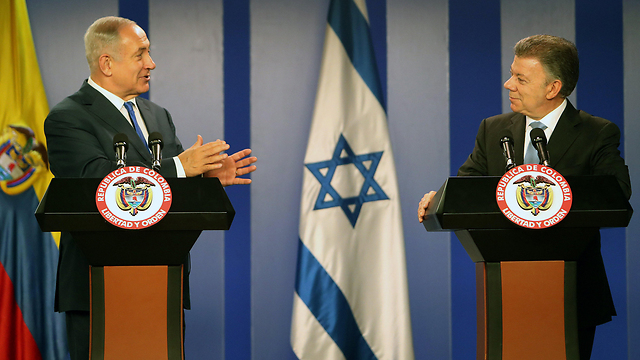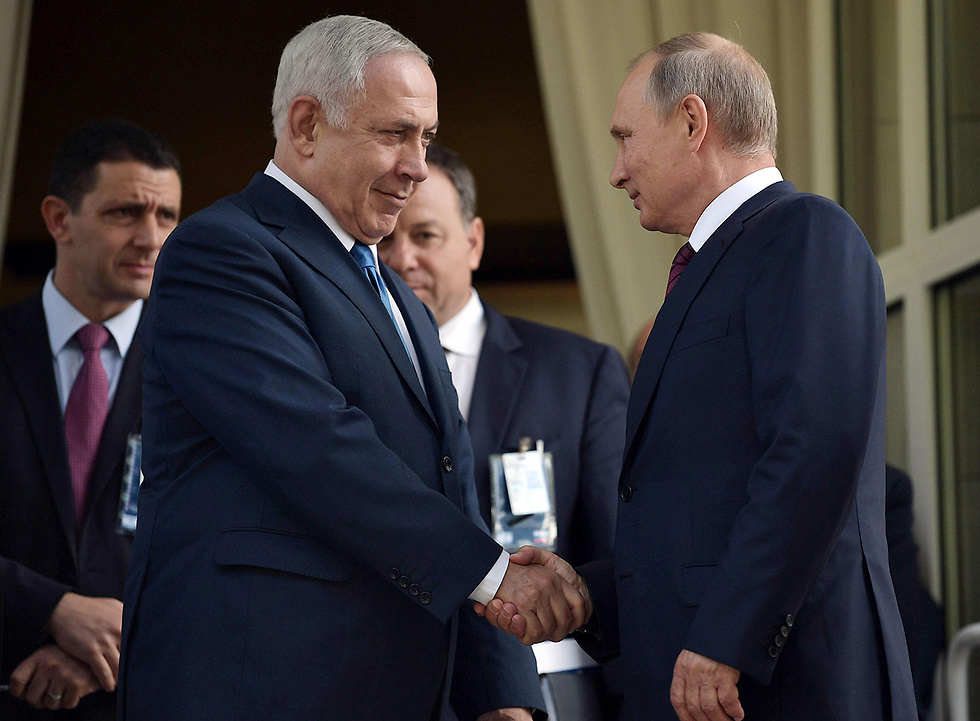
Despite PM's foreign trips, Israel remains nearly isolated in UN
Op-ed: Netanyahu often boasts that Israel is enjoying unprecedented diplomatic prosperity and is admired and appreciated all over the world; but a study examining the voting patterns of the countries the prime minister visited in recent years indicates that the picture hasn’t really changed.
After the 14 other Security Council members voted against Israel and the United States was forced to veto the resolution, the Palestinians turned to the General Assembly. Israel found itself in diplomatic isolation yet again.
Prime Minister Benjamin Netanyahu uses every opportunity to boast that Israel is enjoying unprecedented diplomatic prosperity and that the Jewish state is admired and appreciated all over the world. In September, he told the UN General Assembly that he had visited six continents in the past year and that “I haven't yet visited Antarctica, but I’ve heard that penguins are also enthusiastic supporters of Israel.”
Indeed, Netanyahu has travelled all around the world in the past year. The places he has visited include Australia, China, Argentina, Colombia, Mexico, Africa (three times) and Eastern Europe. Opposition members say Netanyahu is simply using these trips to flee police investigators, but the prime minister insists that these are important diplomatic missions for the purpose of establishing strategic alliances and economic ties that will strengthen the Israeli economy.
Since the formation of the current government, Netanyahu has embarked on 30 journeys abroad, visiting 37 countries (including repeated visits to the same country), and he has been out of the country for 103 days. Eight years after he took office, we should probably ask if there is any diplomatic value in all his journeys when it comes to UN votes and to improving Israel’s position on this front.
Mitvim—the Israeli Institute for Regional Foreign Policies looked into the voting patterns of 35 states in 16 Israel-related votes held at four UN institutions—the Security Council, the General Assembly, UNESCO and the Human Rights Council—from 2009 to 2017. The selected states were mostly countries the prime minister had visited in recent years, in a bid to examine if the efforts to strengthen Israel's bilateral relations with them have also led to a change in their voting patterns in the world’s main multi-national forum.
The research, led by Dr. Roee Kibrik and Dr. Nimrod Goren, revealed that in important UN votes focusing on the Palestinian issue, Israel keeps finding itself isolate. Of the 193 UN member states, the Jewish state is supported primarily by the US, Canada and a few island countries.
“This picture hasn’t changed in the past eight years,” Kibrik and Goren concluded. Nevertheless, this isn’t an indication of Israel’s ability to influence votes held in other international forums, as well as diplomatic processes taking place behind the scenes and not through votes, nor is it a tool for measuring the efforts to strengthen Israel’s bilateral relationships with the world’s countries. All it indicates is that these kinds of efforts—if they are indeed taking place—have yet to yield results in important Israel-related UN votes.
“The prime minister stated recently that the change in the attitude towards Israel in multi-national forums could take a few more years, but the way we see it, without any progress in the Israeli-Palestinian peace process, the chance for a real breakthrough in this area is low,” says Kibrik.
Goren adds, “Israel's policy on the Palestinian issue has a negative impact on Israel's status in the world. Past experience shows that a diplomatic renaissance, like the one the prime minister is hoping for, takes place when Israel shows a real commitment to advance peace and takes steps in that direction.”
China and Russia, for example, two countries which Netanyahu travelled to in the past year (in fact, the prime minister visited Russia five times in the past two and a half years), kept voting automatically with the Palestinians and against Israel.
India, on the other hand, which used to vote against Israel automatically, changed its voting pattern recently in UNESCO’s resolutions on Jerusalem and moved to abstention. Netanyahu is expected to visit India for the first time next month, but Indian Prime Minister Narendra Modi has already visited Israel. In the recent votes on Jerusalem and the Golan Heights in the UN General Assembly, however, India kept voting against Israel's stance.
The African countries, which received frequent visits from Netanyahu in the past two years, have remained loyal to the Palestinian issue in the votes. Argentina and Colombia have kept voting with the Palestinians too, despite Netanyahu’s recent visit to Latin America. Mexico, which received a first visit from the Israeli prime minister, as well as a visit from the Home Front Command’s rescue delegation following the devastating earthquake in the country, changed its voting pattern in 10 Israel-related votes for the first time.
The Visegrád Group, which includes Hungary, Poland, the Czech Republic and Slovakia (three of which were visited by Netanyahu), is traditionally closer to the Israeli stance and can often be seen supporting Israel. In 2009, they supported Israel's stance and opposed the Goldstone Report on the 2008 Israeli operation in Gaza, but have failed to offer Israel their absolute support since then. Sometimes they abstain rather than completely adopting the Palestinian stance. We must remember, however, that as far as Israel is concerned, these countries play a very important role in the European Union, where they prevent anti-Israel resolutions which would have been accepted had they not cooperated with Israel.
Israel's alliance in the Eastern Mediterranean basin and its tightening relations with Cyprus, Greece and Italy (three countries which Netanyahu visited in the past year) have not been reflected in votes focusing on the Palestinian issue.
Paraguay moved from supporting the Palestinians to abstention, which may be an indication of the tightening relations between the two countries. Netanyahu hasn’t visited Paraguay, but he did meet with its president, Horacio Cartes, during his visit to Argentina. Yechiel Leiter, who served as Netanyahu’s bureau chief when he was finance minister, is one of Cartes’ senior advisors.
A favorable change has been recorded in the series of votes held by UNESCO’s Executive Board in 2016 and 2017 around the proposal condemning Israel on the Jerusalem issue and opposing its policy in the city. The votes point to a downtrend in the number of states supporting the proposal: From 33 countries in April 2016 to 22 countries in May 2017.
Netanyahu argued recently during a meeting at the Knesset’s Foreign Affairs and Defense Committee that it would take a few years before we see the changes in the international arena.
According to Foreign-Ministry Spokesman Emmanuel Nahshon, “In the past few years, we have been seeing a favorable strategic change in different countries’ attitude towards the State of Israel. This is reflected, among other things, in international institutions’ votes. When a country moves from voting against Israel to abstention, it is also seen as a diplomatic achievement.
“We must remember that these are long-term processes and that every long journey begins with a first step. The achievements of the Israeli diplomacy led by Prime Minister Netanyahu must be measured over time. The trend is positive and it will keep improving. The State of Israel is a significant player in the international arena, and many countries understand that and are moving closer to us in all respects.”














